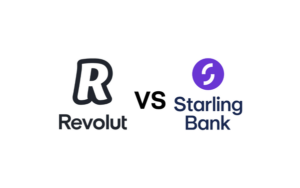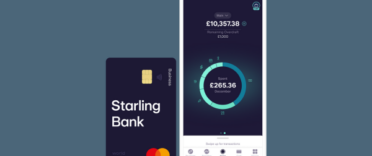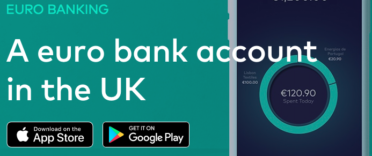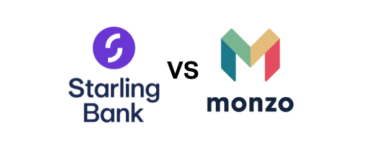
If you are looking for an app-only bank or the cheapest way to spend money abroad, but are struggling to decide which is best for you we compare Revolut and Starling Bank - two of the biggest players in the market. In this article, we give an overview of the key differences between Revolut and Starling Bank but you can also read about each in more detail in our full Revolut review and our full Starling Bank review.
You can use the links below to jump to key parts of this comparison of Starling Bank vs Revolut:
Revolut vs Starling - which is best?
| Revolut | Starling Bank | |
| UK registered bank account | No^ | Yes |
| FSCS protection | No^^ | Yes |
| Personal Account | Yes | Yes |
| Business Account | Yes | Yes |
| Direct debit/Standing order | Yes | Yes |
| Overdraft | No | Yes |
| Personal loan | No | No |
| Money management features | Yes | Yes |
| Round-up spending | Yes | Yes |
| Fee-free spending abroad | Free up to £1,000/month | FREE |
| Fee-free cash withdrawals abroad | Free up to £200/month | FREE |
| Cash deposits | Yes | Yes |
| Cheque deposits | No | Yes |
| Interest on account balance | No | Yes |
| Interest on savings | Yes | Yes |
| Connect other bank accounts to the app | Yes | No |
| Apple Pay/Google Pay | Yes | Yes |
| Samsung Pay | No | Yes |
| Insurance policies | Yes | No (provides links from its marketplace within the app) |
| Invest in cryptocurrencies | Yes | No |
^, ^^ - This is due to change as Revolut now has a banking licence in the UK.
Download the Revolut app for free
Sign-up to Revolut & get a free card with your Revolut Standard account (delivery fees apply)
- Exchange up to £1000/month with no additional fees charged by Revolut (Monday to Friday)
- Withdraw up to £200 or 5 ATM withdrawals per rolling month, with no withdrawal fees charged by Revolut
- Send money in 29+ currencies

Revolut now has a UK banking licence which means it will be able to offer FSCS protection in due course. The bank is in the mobilisation stage during which it will continue to offers its clients e-money accounts. See the section below titled "Revolut vs Starling - FSCS protection" for more details.
Both Revolut and Starling have a host of great features that make them appealing to those who wish to get more from their bank. The fact that neither has a high street branch does not affect the usability of the mobile apps. The money management features that come with app-only banks allow you to understand your finances better and help you to improve your financial well-being with handy budgeting tools and account categorisation. Both apps come with these features, including categorised spending, which allows you to see where your money is going each month.
Starling has the facility to deposit cheques up to £1,000 by scanning them within the app and you can also deposit cash via the Post Office. Revolut doesn't allow cheque deposits at this point, but it does now offer cash deposits which are being rolled out to customers currently.
Revolut does, however, have a range of insurance policies that users can access; some are for those on premium plans only. You can also invest in stocks and digital currencies via the app.
We compare the key features between both Revolut and Starling in the above table but you can read our Revolut review and Starling Bank review for a more in-depth analysis.
Revolut vs Starling - Accounts
| Revolut | Starling Bank | |
| Personal account | Yes | Yes |
| Joint account | No | Yes |
| Business account | Yes | Yes |
| Teen Account | No | Yes (16 & 17 year-olds) |
| Kids Account | Yes (6 - 17 year-olds) | Yes (6 - 16 year-olds) |
| Euro Bank Account | No | Yes |
| Multi-currency Account | Yes | Yes (For business only) |
Both Revolut and Starling have a range of accounts to choose from but Starling comes out on top with a greater account choice. In addition, it is possible to have a joint account with Starling Bank, something that is not yet available with Revolut.
Both Revolut and Starling have options for children's cards. With Revolut you can get one <18 account for free with its standard plan however the features that you have access to are limited. If you want access to more <18 accounts and additional features you will need to subscribe to a premium Revolut plan. Starling Bank has a free Starling Kite account for 6 - 16 year-olds which is accessible via your personal account. Once your child turns 16 they can benefit from a Starling Bank Teen account where they get all of the features of the main account without an overdraft and with some age-restricted transactions. The Starling Bank Teen account is also free and can be set up via a smartphone.
Revolut has a multi-currency account which allows you to spend and exchange in up to 30 currencies. Starling Bank also has a multi-currency account for business holders only but this is only available in Euros or US Dollars. You can however open a personal Euro account with Starling Bank.
Finally, both Revolut and Starling Bank have business accounts which we look at in more detail in our reviews:
Revolut vs Starling - Fees
| Revolut | Starling Bank | |
| Monthly account fee | £0 (for the free plan) | £0 |
| Subscription accounts/plans with additional features | £3.99/£7.99/£14.99/£45.00 a month | N/A |
| Fee-free spending abroad | Free up to £1,000/month then up to 1% fee | No charge |
| ATM withdrawals abroad | 2% fee (min £1) over 5 withdrawals or £200/month whichever comes first | No charge |
| ATM withdrawals in the UK | 2% fee (min £1) over 5 withdrawals or £200/month whichever comes first | No charge |
| International Transfers | Varies depending on the currency. You can calculate the exact fee here | 0.4% + local transfer fees and £5.50 for SWIFT payments. Find out more here |
| Overdraft interest rate | No overdraft facility | 15%, 25% or 35% AER |
| Depositing cash | Does not accept cash deposits | 0.7% fee over £1,000 per year |
| Replacement debit cards | £5 plus delivery fee | £5 in the UK, £10 if lost abroad |
When it comes to fees, Starling is cheaper in comparison to Revolut as you can withdraw money from ATMs fee-free both abroad and in the UK (some ATMs may charge a fee) as well as spend abroad at no extra cost. Revolut does let you spend abroad and withdraw cash fee-free but this is capped at a certain limit depending on your plan. Some of these limits are lifted if you opt for Revolut's paid plans. Up until 31st December 2024 you can sign up to a Revolut Premium 3 month trial* and get an exclusive personalised premium card (T&Cs apply).
3-month Revolut Premium trial
Sign-up to a Revolut Premium 3 month trial & get an exclusive personalised premium card
- Exchange unlimited amounts in 29+ currencies with no additional fees charged by Revolut (Monday to Friday)
- Withdraw up to £400 per rolling month, with no withdrawal fees charged by Revolut
- Save 20% on international transfer fees, no limits
- Discounted airport lounge passes

Revolut vs Starling - Spending abroad
| Revolut | Starling Bank | |
| Fee-free spending abroad | Free up to £1,000/month (on the Standard plan) | No charge |
| ATM withdrawals abroad | Free up to £200/month (on the Standard plan) | No charge |
| Exchange rate | Interbank | Mastercard |
If you want to spend abroad with no fees then Starling may be the better option as there are no limits to how much you can spend. Revolut uses the Interbank exchange rate which is a variable rate which means it is constantly changing.
When you spend on your card Revolut uses this rate to exchange the currencies. Starling Bank uses the Mastercard exchange rate to convert your money when you spend on the card. While it is often said that the Interbank exchange rate is better than the Mastercard exchange rate, our experience is that this is not always true, as prices fluctuate. Usually, any differences are relatively small.
Revolut vs Starling - FSCS protection
| Revolut | Starling Bank | |
| UK registered bank account | No | Yes |
| FSCS protection | Not yet | Yes |
Revolut now has a UK banking licence after receiving authorisation with restrictions by the Prudential Regulation Authority (PRA). During its mobilisation stage, which is currently ongoing, Revolut will continue to offer e-money accounts to its customers. However, in due course, it will offer full-fledged UK bank accounts much like Starling.
In the meantime, Revolut says it 'safeguards' your money in a client money bank account which means that 'the money in these accounts would be used to pay out you (and our other customers) before anyone else.' With Starling Bank, your money is protected up to £85,000 per person under the FSCS.
Revolut vs Starling - Rewards
| Revolut | Starling Bank | |
| Cashback | Earn up to 10% cashback on Revolut Stays | Earn cashback if you integrate with Tail within the Starling Marketplace. |
| Rewards | Benefit from cashback and rewards when you shop with certain retailers using your Revolut card | No |
| Marketplace | No | Connect with other financial products to benefit from additional products including insurance, pensions and investment accounts. |
You can benefit from rewards and cashback with Revolut even as a standard user and can benefit for up to 10% cashback if you purchase accommodation via Revolut Stays (10% cashback is with a subscription account). Starling Bank has limited rewards and cashback offers in its app which means that Revolut is slightly better when it comes to offering user perks. Starling Bank does have a marketplace, however, where you can get access to other financial products, and there is the opportunity to earn some cashback if you connect to Tail.
Revolut vs Starling - Saving
| Revolut | Starling Bank | |
| Savings pots | Yes | Yes |
| Round up spending | Yes | Yes |
| Saving account | Yes | Yes |
| Interest rate | Between 2.29% - 4.75% depending on the Revolut plan | 3.25% on current account balance up to £5,000
4% on the Easy Saver 4.05% on the 1-Year Fixed Saver |
Both Revolut and Starling have savings pots and round-up functions to allow you to save spare change and save for rainy days or a particular savings goal. Revolut does also have the option to open a Savings Vault where you can earn interest on your savings. Depending on which Revolut plan you have you can earn up to 4.75% interest on your savings and your money is saved with an FSCS-protected provider. Starling Bank has a 1-Year Fixed Saver for its personal current account holders that allows you to earn 4.05% interest on balances over £2,000. There is also a new Easy Saver which pays 4% AER with no minimum deposits and no limits as to when you can access your cash. For the time being, you can also earn 3.25% interest on your current account balance up to £5,000 with Starling Bank, however this is due to end on 10th February 2025. After this point, Starling will no longer offer interest on its current account.
Revolut vs Starling - Lending
| Revolut | Starling Bank | |
| Overdraft | No | Yes |
| Personal loans | No | No |
| Business loans | No | Yes |
Revolut does not currently offer credit to its users and opening an account with Revolut does not require a credit check. Starling Bank offers account holders an overdraft facility between £500 and £5,000. You will need to apply for this and approval will be subject to a credit check and a hard search on your credit report. If you do not apply for credit with Starling Bank, a soft search will be conducted when you open a Starling account, which will not impact your credit rating.
Revolut vs Starling - Customer reviews
| Revolut | Starling Bank | |
| Trustpilot rating | 4.3/5 | 4.2/5 |
Revolut has a 4.3/5 rating on Trustpilot, while Starling Bank has a 4.2/5 rating on the consumer review website. 76% of over 40,000 users rate Starling Bank as excellent with 75% of more than 170,000 users rating Revolut as excellent. Starling Bank users commented on good customer service, a prompt set up and great to use overseas. Revolut users cited a user-friendly app, efficient for spending money abroad and great customer service.
Revolut vs Starling - Summary
If you are after an app-only bank and current account that offers the products and services you've come to expect from a UK bank then Starling Bank will appeal over Revolut. Revolut's account offers many of the features that traditional bank accounts offer, such as sort codes and account numbers. However, it works particularly well as a prepaid card when travelling abroad, particularly with some of the perks on offer by the paid plans.
Both Revolut and Starling are among the cheapest ways to spend money overseas and there is little to choose between them. Revolut's free plan does have monthly spending limits beyond which fees are applied to overseas spending, but they are minimal. These fees can be reduced if you pay a monthly charge for one of Revolut's more expensive paid-for plans which also offer perks such as airport lounge access.
Meanwhile, Starling does not apply limits on overseas spending or ATM usage, meaning that Starling's current account offers fee-free use abroad which is impressive. The difference then comes down to the exchange rate used by both when converting your money, as detailed in the section above titled "Revolut vs Starling - Spending abroad" and whether you want a UK current account for future use (Starling) or just a prepaid card to use when on holiday (Revolut).
If a link has an * beside it this means that it is an affiliated link. If you go via the link, Money to the Masses may receive a small fee which helps keep Money to the Masses free to use. The following link can be used if you do not wish to help Money to the Masses or take advantage of any exclusive offers - Starling Bank, Revolut




